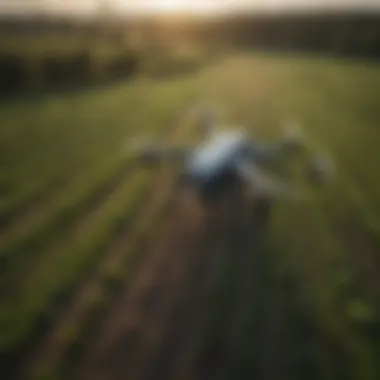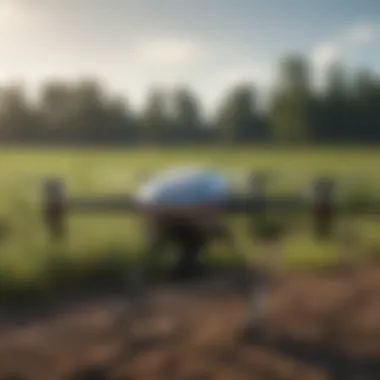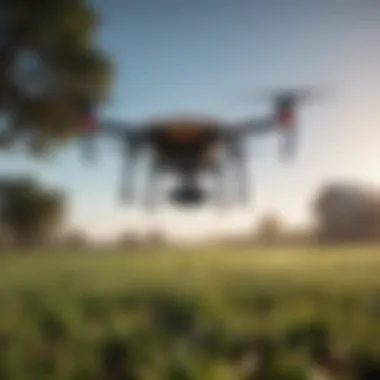Exploring Drone Job Opportunities in Jacksonville, FL


Intro
The drone industry has witnessed substantial growth, reshaping multiple sectors, including agriculture and environmental monitoring. Jacksonville, Florida, is no exception to this trend. With its rich agricultural landscape and innovative spirit, the city provides unique opportunities for individuals interested in pursuing careers linked to drone technology. Understanding what skills are needed and how to navigate this evolving job market can be crucial for those looking to enter the field.
Topic Overview
Definition of Key Terms
To effectively engage with drone jobs, it is essential to understand certain key terms:
- Drone: An unmanned aerial vehicle (UAV) that can fly autonomously or be piloted remotely.
- Aerial Mapping: The process of using drones to capture detailed images of land, which are processed into maps.
- Precision Agriculture: Farming management based on observing, measuring, and responding to field variability in crops.
- Environmental Monitoring: The use of drones to collect data related to environmental changes, such as deforestation or water quality.
Relevance in Agriculture, Horticulture, and Agronomy
In Jacksonville, drone technology is increasingly relevant across agriculture, horticulture, and agronomy sectors. Farmers utilize drones for:
- Crop Surveillance: Monitoring crop health using aerial imagery.
- Soil Analysis: Assessing soil moisture and nutrient levels.
- Pest Management: Identifying pest infestations from above, allowing for targeted interventions.
- Irrigation Management: Optimizing water usage through accurate data collection.
These applications contribute to improved efficiency, productivity, and sustainability in farming practices.
Current Trends and Innovations
Recent Advancements in the Field
The drone sector continually evolves, characterized by:
- Enhanced Imaging Technology: Drones are now equipped with high-resolution cameras and thermal imaging, improving data accuracy.
- Automated Analytics Software: New applications automate data analysis, providing real-time insights to farmers.
- Regulatory Changes: The Federal Aviation Administration is adapting regulations to support drone operations in agriculture.
Emerging Technologies and Practices
Emerging technologies bolster the functionality of drones. Noteworthy advancements include:
- AI Integration: Artificial intelligence is increasingly used to analyze drone-captured data for quicker and more accurate decision-making.
- LiDAR Technology: Light Detection and Ranging can provide precise topographical data, beneficial for land planning and crop assessments.
These innovations open avenues for more efficient farming practices in Jacksonville and beyond.
Practical Applications
Step-by-Step Guides or How-Tos
Engaging with drone technology starts with understanding its practical applications. Here are steps to incorporate drones into agricultural practices:
- Understand the Legal Requirements: Familiarize yourself with FAA regulations regarding drone operation in agriculture.
- Choose the Right Drone: Select a drone suitable for the specific agricultural tasks you wish to undertake.
- Learn How to Operate Drones: Undergo training or certification courses to become proficient in flying and data interpretation.
- Develop a Data Collection Plan: Outline what information you need and how often you intend to gather it.
- Analyze Collected Data: Utilize software to interpret images and data, guiding your agricultural decisions.
Tips and Best Practices for Implementation
Here are some best practices for utilizing drones effectively:
- Regular Maintenance: Ensure your drone is well-maintained to avoid malfunctions during operation.
- Stay Updated on Regulations: Keep informed on changes in drone regulatory frameworks to maintain compliance.
- Collaboration: Work with agronomists and other agricultural experts to maximize drone capabilities.
Efficient use of drone technology can dramatically enhance agricultural output and operational efficiency, making it an invaluable tool for farmers in Jacksonville.
As the job market continues to expand, engaging with these trends can position individuals to capitalize on the growing demand for drone-related roles.
Preface to Drone Technology


The introduction of drone technology marks a significant advancement in multiple sectors, particularly in agriculture and environmental monitoring. Understanding the landscape of drone capabilities enables stakeholders to leverage these tools effectively. Drones serve various functions, including aerial photography, data collection, and surveying. Their efficiency and versatility can enhance operational productivity significantly.
As drone usage continues to evolve, the potential for specialized applications increases. Integrating drones into traditional workflows can lead to innovative practices, addressing challenges such as environmental sustainability and resource management. This section aims to provide a solid foundation for comprehending drone technology's relevance in job opportunities within Jacksonville, Florida.
Understanding Drones and Their Functions
Drones, often referred to as unmanned aerial vehicles (UAVs), are equipped with diverse technology that allows them to perform various tasks without direct human control. Some common functions include:
- Aerial Surveys: Utilizing High-resolution cameras and sensors for land assessments.
- Mapping and Monitoring: Drones can create 3D models or monitor changes over time in agriculture fields.
- Crop Management: By gathering data on crop health, farmers can make informed decisions on resource allocation.
The ability to access hard-to-reach areas makes drones invaluable. They can gather information more quickly and accurately compared to traditional methods. As a result, they provide significant insights that can lead to improved yield and operational efficiency, especially important for farmers and agricultural enthusiasts.
The Evolution of Drone Usage in Various Industries
The historical progression of drones traces back to military applications. However, their versatility has driven adoption across numerous sectors, including:
- Agriculture: Drones are now fundamental in enhancing precision farming practices. They allow real-time data collection to optimize crop production.
- Construction: Companies use drones for site surveying and project monitoring, improving oversight and budget efficiency.
- Environmental Monitoring: These devices facilitate wildlife conservation efforts and ecological assessments by providing critical data in hard-to-reach locations.
In Jacksonville, the drone industry's expansion presents significant opportunities. As regulations become defined and technology advances, more sectors are likely to understand the value that drones bring. Training and utilizing drones in Jacksonville for various sectors could redefine operational efficiency and reshape job roles in the future. By exploring these aspects now, stakeholders can position themselves advantageously in the upcoming drone job market.
Current Drone Job Market in Jacksonville
The drone job market in Jacksonville, Florida, is witnessing significant growth. This increase is attributed to various factors, including advancements in technology, a rise in applications across different sectors, and a growing demand for skilled operators. As industries adopt drone technology, opportunities continue to expand, making this a fertile ground for job seekers. Understanding the sectors leading this trend is crucial for those who wish to pursue careers in this field. It is also important to consider the various qualifications and skills that can enhance employability in the drone market.
Sectors Hiring Droners
Environmental Monitoring
Environmental monitoring through drones is becoming more essential due to ongoing climate change challenges. Drones offer a unique advantage by providing real-time data collection over large areas. This capability allows for better monitoring of wildlife, vegetation, and water quality. Environmental professionals utilize drones to gather information that was previously hard to obtain, enhancing research efforts and regulatory compliance.
The key characteristic of this sector is its focus on data accuracy and efficiency. The benefit of using drones is their ability to cover hard-to-reach places quickly and safely. However, one disadvantage may be the reliance on technology, which can occasionally fail, potentially leading to incomplete data.
Agriculture and Horticulture
Agriculture is one of the primary sectors driving demand for drone technology. Drones are used for crop monitoring, irrigation management, and even planting seeds. This technology allows farmers to assess crop health from the air, identify pests earlier, and manage resources more effectively.
The key characteristic of agriculture-related drone jobs is their contribution to increasing productivity and sustainability. Using drones, farmers can make informed decisions, thus optimizing operations. However, a disadvantage might involve the initial investment needed for drone equipment and training.
Construction
In construction, drones play an important role in project management and site inspection. They allow for quick aerial surveys, helping project managers monitor progress and ensure compliance with safety regulations. Drones dramatically reduce the time required for site evaluations compared to traditional methods.
The key characteristic is their ability to provide accurate topographic maps and 3D models, crucial for project planning. This sector benefits from the use of drones, as they result in time and cost savings. However, the learning curve associated with drone operation can pose a challenge for new entrants.
Real Estate
The real estate market in Jacksonville is also leveraging drone technology. Drones facilitate stunning aerial photography and videography that enhances property listings. Real estate agents can showcase properties from unique angles, improving buyer engagement.
A key characteristic of this sector is its focus on visual marketing. Drones offer a benefit by attracting potential buyers through captivating visuals. On the other hand, a disadvantage is that not all clients may appreciate or understand the technology, potentially limiting its effectiveness.
Employment Trends and Opportunities
The employment landscape for drone jobs in Jacksonville continues to shift with the technology. There is a significant increase in demand for skilled operators who understand both the technical and regulatory aspects of drone use. As industries diversify their applications for drones, the number of positions available within each sector points towards promising career opportunities.
The market indicates a trend where professionals with relevant certification and practical experience will be more sought after, highlighting the importance of continuous education and training. With the potential for emerging technologies, individuals pursuing drone careers in Jacksonville could find themselves in a rapidly evolving and dynamic field.


Significance of Drones in Agriculture
Drones have emerged as a powerful tool within the agricultural sector, drastically transforming traditional farming practices. Their significance lies in enhancing efficiency, improving crop yields, and offering farmers data-driven insights. As the agriculture industry faces increasing pressure to produce more food sustainably, drone technology provides solutions that are both innovative and practical. This section will explore not only the advancements drones bring to agriculture but also their multifaceted role in precision farming and environmental stewardship.
Precision Agriculture Innovations
One of the primary benefits of drones in agriculture is their ability to facilitate precision farming. This approach relies on detailed, real-time data to make informed decisions that enhance resource usage while minimizing waste. Drones equipped with multispectral cameras can capture high-resolution imagery of fields, allowing farmers to analyze variations in crop health.
Key aspects of precision agriculture innovations include:
- Targeted Application of Inputs: With precise data, farmers can apply fertilizers and pesticides in the exact quantities needed. This reduces excess usage and minimizes environmental impact.
- Improved Crop Monitoring: Drones enable regular monitoring of crops, making it easier to detect issues like pests or diseases early on. Early intervention can substantially increase chances of recovery and prevent larger losses.
- Efficient Water Management: By assessing moisture levels, drones help farmers manage irrigation more effectively. This leads to conserving water and ensuring optimal moisture levels for crops.
Impact on Crop Management
Drones have a considerable impact on overall crop management. They provide farmers with actionable insights that help optimize production methods. By integrating drone technology into daily operations, farmers can achieve more sustainable farming practices.
Some of these impacts include:
- Data-Driven Decisions: Drones enable the collection of data over time, which can be analyzed to refine farming techniques. Trends in crop performance can lead to better crop selection and rotation practices.
- Yield Prediction: With the use of drones, farmers can gather relevant data that aids in predicting crop yields more accurately. This information helps with planning and resource allocation.
- Reduced Labor Costs: Drones can perform tasks that would traditionally require significant manual labor. This efficiency leads to cost savings and allows farm workers to focus on more essential operations.
Soil and Health Monitoring
Drones are also pivotal in soil and health monitoring, a crucial aspect of sustainable agriculture. By analyzing soil health, farmers can make informed decisions about land management and crop choice.
Some details include:
- Soil Composition Analysis: Drones can capture data on soil variability by using sensors that assess different soil properties. Understanding soil composition helps farmers amend and enrich the soil appropriately.
- Detecting Irrigation Issues: Monitoring vegetation cover and soil moisture through drones can unveil irrigation problems. Identifying areas of concern in real-time leads to timely solutions.
- Biodiversity Assessment: Drones can support in monitoring the ecosystem on farmland, ensuring that biodiversity is maintained. This contributes to healthier farm environments and sustainable practices.
The integration of drone technology in agriculture represents a significant advancement in farming methodologies, setting the stage for innovative practices that can meet the demands of future generations.
Qualifications and Skills Required for Drone Jobs
As the drone industry continues to evolve, the qualifications and skills required for drone jobs become increasingly significant. Understanding these requirements can pave the way for aspiring drone operators and professionals to thrive in this competitive space. Knowledge of the right education, technical abilities, and soft skills considerably enhances job readiness and success in various drone-related fields.
Educational Background
Having a solid educational foundation is essential for anyone pursuing a career in the drone sector. Many employers seek candidates with at least a high school diploma. However, holding a degree in fields such as aviation, engineering, environmental science, or agriculture often provides a competitive edge. Academic programs focusing on drone technology are also gaining traction.
Courses in aviation technology or unmanned aircraft systems (UAS) specifically cover vital areas such as:
- Drone operations and safety measures
- Aerodynamics and flight mechanics
- Data analysis and interpretation
Additionally, workshops and certification programs, such as those offered by the Federal Aviation Administration (FAA), enhance one’s credibility. Individuals eager to enter the drone job market should consider these educational paths to establish a strong base for their careers.
Technical Skills and Certifications
A strong grasp of technical skills is crucial for effectively operating drones and managing aerial data collection. Candidates must be familiar with the equipment and software involved in drone operation. Key technical skills include:
- Proficiency in using drone software for mapping and surveying
- Understanding of aeronautical science and local airspace rules
- Ability to conduct pre-flight checks and troubleshoot issues
Certifications, particularly from the FAA, are necessary for many drone jobs. The FAA Part 107 certification allows drone operators to make commercial flights legally. This involves passing a knowledge test that covers essential topics ranging from airspace classifications to regulations. In addition, specialized certifications may be beneficial depending on the sector, such as precision agriculture or environmental monitoring.
Soft Skills for Success in Drone Operations
While technical skills are paramount, soft skills often influence an individual’s ability to collaborate and adapt in tech-driven environments. Key soft skills include:


- Communication: Clear communication is vital when collaborating with team members and interpreting client needs.
- Critical thinking: Drone operators must quickly assess situations and make informed decisions.
- Attention to detail: Monitoring safety protocols and ensuring data accuracy are essential in drone operations.
"Being proficient in both technical operations and interpersonal skills positions candidates favorably in the drone job market."
Regulations Impacting Drone Employment
Understanding the regulations surrounding drone employment is critical. These regulations not only safeguard public safety but also shape the path for career development. Familiarity with these rules ensures that drone operators can navigate the job market effectively. Compliance with regulatory guidelines can prevent potential legal issues and promote professionalism in the field.
FAA Regulations and Compliance
The Federal Aviation Administration (FAA) plays a pivotal role in drone job regulations. Its primary goal is to ensure safe airspace use while encouraging innovation in the aviation industry. Key FAA regulations impacting drone employment include:
- Part 107 Certification: Operators must obtain a remote pilot certificate to fly commercial drones. This involves passing a knowledge test that covers topics such as airspace regulations, weather, flight operations, and drone maintenance.
- Operational Limitations: Drones must be flown below 400 feet and within visual line of sight. Specific restrictions are also placed on flying near airports or in controlled airspaces.
- Registration: All drones weighing more than 0.55 pounds must be registered with the FAA. This ensures accountability and tracking of drone usage.
Understanding these regulations allows individuals to position themselves as compliant and informed candidates when entering the job market.
State and Local Regulations in Florida
In addition to federal laws, each state may impose its regulations for drone operations. Florida’s laws include specific rules that operators must follow:
- Privacy Laws: Florida places significant emphasis on privacy. Drone operators must be cautious to avoid violating individual privacy rights, especially when flying over private property.
- Insurance Requirements: Certain local jurisdictions may require drone insurance. This mitigates risks associated with potential damages or accidents.
- Permits for Commercial Use: While the FAA provides broad guidelines, local authorities might mandate additional permits for commercial drone operations in specific areas.
Knowledge of these regulations is not just beneficial; it is essential for anyone wanting to work in the drone sector in Jacksonville. The legal landscape is pivotal in ensuring the sustainability of drone jobs and the safety of operations.
Future Outlook for Drone Jobs in Jacksonville
The outlook for drone jobs in Jacksonville is both pivotal and promising. As technology advances, the drone industry continues to expand, creating new roles and opportunities. The convergence of drone technology with essential industries enhances the need for skilled operators, analysts, and support staff. Understanding the future of these jobs is crucial for job seekers and businesses alike.
Emerging Technologies and Trends
Emerging technologies within the drone sector indicate significant changes and advancements. Innovations like artificial intelligence, machine learning, and enhanced sensor capabilities are becoming commonplace in drone operations. These technologies improve efficiency and data analysis, allowing drones to collect and interpret data more effectively. For example, drones equipped with LiDAR technology can create detailed 3D maps of agricultural fields, assisting farmers in planning and management.
Moreover, software integration is critical. Platforms that allow operators to control multiple drones simultaneously are being developed. This trend towards automation not only streamlines operations but also reduces labor costs. As a result, companies are seeking employees who are adept at handling this advanced technology.
Additionally, industry-specific applications are expanding. For instance, drones are increasingly used for environmental monitoring, capturing data for conservation efforts. In Jacksonville, local initiatives to protect waterways have spurred demand for drone operators skilled in environmental surveying.
Potential Growth in the Job Market
The job market for drone-related positions in Jacksonville is on an upward trajectory. With the steady integration of drones in various sectors, job openings are likely to proliferate. According to industry reports, the drone market could grow at an annual rate of 20% in the coming years. This expectation translates to real jobs and increased demand.
Key sectors investing in drone technology include:
- Agriculture: There’s a rising need for agronomists who understand drone technology's role in precision farming.
- Construction: As builders adopt drones for site surveying and project monitoring, certified pilots will become essential.
- Real Estate: Capturing aerial views of properties enhances marketing efforts, driving demand for trained drone photographers.
"The demand for skilled drone operators is expected to double in the next five years, making this an opportune time for career development in the sector."
End
The conclusion of this article serves as a crucial summary of all the discussions surrounding drone jobs in Jacksonville, Florida. It highlights the significance of understanding the evolving job market that integrates advanced drone technology within various sectors, especially agriculture. By consolidating the key insights, readers will grasp the profound impacts drones can have on operational efficiency, cost-effectiveness, and overall productivity. This understanding is indispensable for those seeking to navigate their careers within this dynamic field.
Recap of Key Points
In brief, several salient points regarding drone jobs in Jacksonville can be summarized:
- Diverse Sectors Engaging Drones: Drones are employed in numerous fields, particularly in agriculture, real estate, construction, and environmental monitoring.
- Key Qualifications Needed: Competence in drone operation requires an educational background in relevant technical fields, coupled with specific certifications.
- Regulatory Environment: An awareness of the FAA regulations and local laws in Florida is necessary for compliance in drone operations.
- Future Employment Trends: The job market is projected to expand with advancements in technology, reflecting a growing need for skilled professionals.
This recapitulation underscores the central themes explored in the article, emphasizing the importance of drone technology in modern professional environments.
Final Thoughts on Drone Careers
As one reflects on the trajectory of drone careers, it is clear that the integration of drone technology is not merely a trend but a transformative force across industries. For individuals with an interest in agriculture, the opportunities that drones present revolve around addressing complex challenges such as precision farming and resource management. The future appears promising, though it demands a commitment to continuous learning and adaptation.
The multifaceted nature of drone jobs offers extensive avenues for growth and specialization. Those ready to engage with this emerging field can expect not just a career, but the chance to be at the forefront of innovation in agriculture and beyond. The conversation about drone usage and its implications for the workforce in Jacksonville is only beginning.



